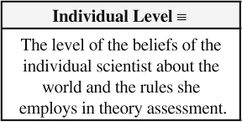Difference between revisions of "Individual Level (Barseghyan-2015)"
| Line 6: | Line 6: | ||
|Authors List=Hakob Barseghyan, | |Authors List=Hakob Barseghyan, | ||
|Formulated Year=2015 | |Formulated Year=2015 | ||
| − | |Description=The individual level is defined by Hakob Barseghyan as an individual scientist who has her own set of ideas and beliefs about the world, and employs certain methods which might be different than the accepted methods of the time. H. Barseghyan also briefly mentions how changes in the individual level occur when an individual changes her beliefs and employs different rules than she has in the past. | + | |Description=The individual level is defined by Hakob Barseghyan as an individual scientist who has her own set of ideas and beliefs about the world, and employs certain methods which might be different than the accepted methods of the time. H. Barseghyan also briefly mentions how changes in the individual level occur when an individual changes her beliefs and employs different rules than she has in the past. [[CiteRef::Barseghyan (2015)p. 43]] |
|Resource=Barseghyan (2015) | |Resource=Barseghyan (2015) | ||
| − | |||
| − | |||
| − | |||
|Page Status=Stub | |Page Status=Stub | ||
}} | }} | ||
Revision as of 19:58, 3 December 2018
This is a definition of Individual Level that states "The level of the beliefs of the individual scientist about the world and the rules she employs in theory assessment."
This definition of Individual Level was formulated by Hakob Barseghyan in 2015.1 It is currently accepted by Scientonomy community as the best available definition of the term.
Contents
Scientonomic History
Acceptance Record
| Community | Accepted From | Acceptance Indicators | Still Accepted | Accepted Until | Rejection Indicators |
|---|---|---|---|---|---|
| Scientonomy | 1 January 2016 | The definition became de facto accepted by the community at that time together with the whole theory of scientific change. | Yes |
Question Answered
Individual Level (Barseghyan-2015) is an attempt to answer the following question: What is individual level? How should it be defined?
See Individual Level for more details.
Description
The individual level is defined by Hakob Barseghyan as an individual scientist who has her own set of ideas and beliefs about the world, and employs certain methods which might be different than the accepted methods of the time. H. Barseghyan also briefly mentions how changes in the individual level occur when an individual changes her beliefs and employs different rules than she has in the past. 2
Reasons
No reasons are indicated for this definition.
If a reason supporting this definition is missing, please add it here.
Questions About This Definition
There are no higher-order questions concerning this definition.
If a question about this definition is missing, please add it here.
